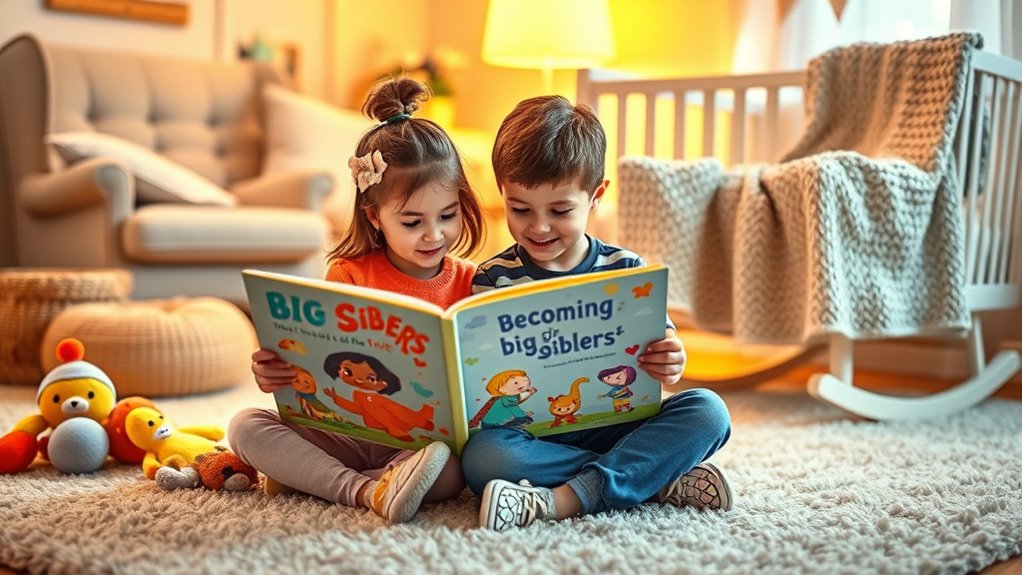To prepare your older child for a new baby, start early conversations about the upcoming changes in your family. Involve them in preparations by letting them choose toys or help with setting up the nursery. Talk openly about their feelings—excitement, jealousy, or anxiety—and reassure them that it’s normal. Assign them age-appropriate tasks to care for the baby, and make sure to maintain one-on-one time with them. There’s much more you can do to support this transition.
Key Takeaways
- Start conversations early about the new baby to help siblings understand the changes ahead.
- Involve the older child in preparations, allowing them to choose items for the baby’s nursery.
- Use dolls or stuffed animals to practice baby care skills, like feeding and diapering.
- Acknowledge and discuss mixed emotions, reassuring siblings that feelings like jealousy or excitement are normal.
- Set aside special time for the older child to maintain their bond and provide attention.

Preparing for a new baby can be an exciting yet challenging time for families, especially for siblings who may feel uncertain about the changes ahead. To help your older child adjust, start communicating about the new arrival early on. Talk openly about what a new baby means for your family and invite your child into the preparation process. Let them pick out toys, clothes, or even help set up the nursery. This involvement helps them feel included and valued during this transition.
Preparing for a new baby can be exciting yet challenging; involve your older child to help ease their transition.
Using dolls or stuffed animals, practice some baby care tasks together. Show your child how to feed, diaper, and soothe a baby. This practice can ease anxiety and make them feel more confident when the real baby arrives. Maintaining routines is also essential; try to keep their daily schedule consistent, even after the new baby comes home. Familiar routines can provide a sense of stability amidst the changes.
It’s crucial to discuss the emotional landscape surrounding the arrival of a new sibling. Your child might feel excited, jealous, or even anxious. Be honest about these feelings and reassure them that it’s normal to have mixed emotions. Use age-appropriate language to explain what’s happening, and consider introducing books or TV shows that explore sibling relationships and the arrival of a new baby. These resources can help your child understand and express their feelings better.
Assigning age-appropriate tasks can also make your older child feel included in caring for the new baby. Simple tasks, like fetching diapers or helping with bath time, can foster a sense of responsibility and connection. Always praise their efforts, reinforcing positive behavior and kindness. Explain safety measures too, like not placing toys in the crib, to ensure they understand how to interact safely with the baby.
As the transition unfolds, balancing attention between the new baby and your older child is vital. Set aside special time for them to maintain their bond with you. Encourage interactions between siblings to help develop their relationship. Be prepared for potential conflicts and approach them with patience and understanding. This transition is a big change for everyone involved, and your support will help ease the process.
Consider enrolling your older child in sibling preparation classes or arranging hospital visits to meet the baby. These experiences can provide emotional support and help them feel more connected to the new family dynamic. By taking these steps, you’ll set the stage for a loving, supportive environment as everyone welcomes the new addition to the family.
Frequently Asked Questions
What Age Is Best for Introducing a New Baby to Siblings?
The best age for introducing a new baby to siblings varies, but generally, toddlers and preschoolers can grasp the concept better.
Around age 2 to 4, children begin to understand family dynamics, making them more receptive.
As they age, they can actively participate in preparations and caregiving.
Regardless of their age, it’s crucial to ensure they feel secure and involved to foster a positive relationship with their new sibling.
How Can I Involve Siblings in Baby Care?
You can involve siblings in baby care by assigning them age-appropriate tasks like holding a bottle or picking out clothes.
Encourage them to participate in daily routines such as bath time or diaper changes, always under your supervision.
Teach them about baby safety and praise their contributions to build confidence.
Engage in activities together, like reading or playing, to strengthen their bond with the baby and foster a sense of shared responsibility.
Should I Give Siblings a Gift When the Baby Arrives?
Imagine the joy of unwrapping a special gift, just like a treasure chest bursting with surprises.
Yes, you should absolutely give siblings a gift when the baby arrives! It makes them feel included, celebrated, and can ease any feelings of being overlooked.
Choose something personalized or with a “big sibling” theme.
How Do I Manage Sibling Jealousy After the Baby Comes?
To manage sibling jealousy after the baby arrives, focus on involving your older child in caring for the new baby.
Praise their efforts to boost their confidence and encourage positive interactions.
Spend one-on-one time with them to show they’re still valued.
Normalize their feelings by letting them express emotions, and avoid comparisons between siblings.
What Are Signs of Sibling Anxiety About the New Baby?
You might think sibling anxiety isn’t a big deal, but it can significantly affect your older child.
Signs include jealousy, anger, and insecurity about their place in the family. They may become clingy or show regressive behaviors like thumb sucking or bedwetting.
Your child might act out towards you while being overly affectionate with the new baby, or express fears of being pushed aside.
Recognizing these signs early can help you address their concerns effectively.
Conclusion
So, as you gear up to welcome your new bundle of joy, remember to prepare your older kids for the delightful chaos ahead. After all, what’s more fun than turning their world upside down? Just imagine their faces when they realize they’ve traded in their solo playtime for a lifetime of sharing toys and parental attention! It’s the ultimate sibling initiation. Embrace the madness, and soon they’ll be experts in negotiation—who knew sibling rivalry could be so entertaining?









